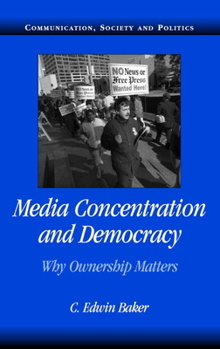Media Concentration and Democracy: Why Ownership Matters
(Part of the Communication, Society and Politics Series)
Select Format
Select Condition 
Book Overview
Firmly rooting its argument in democratic and economic theory, the book argues that a more democratic distribution of communicative power within the public sphere and a structure that provides safeguards against abuse of media power provide two of three primary arguments for ownership dispersal. It also shows that dispersal is likely to result in more owners who will reasonably pursue socially valuable journalistic or creative objectives rather than a socially dysfunctional focus on the 'bottom line'. The middle chapters answer those agents, including the Federal Communication Commission, who favor 'deregulation' and who argue that existing or foreseeable ownership concentration is not a problem. The final chapter evaluates the constitutionality and desirability of various policy responses to concentration, including strict limits on media mergers.
Format:Paperback
Language:English
ISBN:0521687888
ISBN13:9780521687881
Release Date:December 2006
Publisher:Cambridge University Press
Length:272 Pages
Weight:0.85 lbs.
Dimensions:0.7" x 6.2" x 8.9"
Customer Reviews
0 rating





